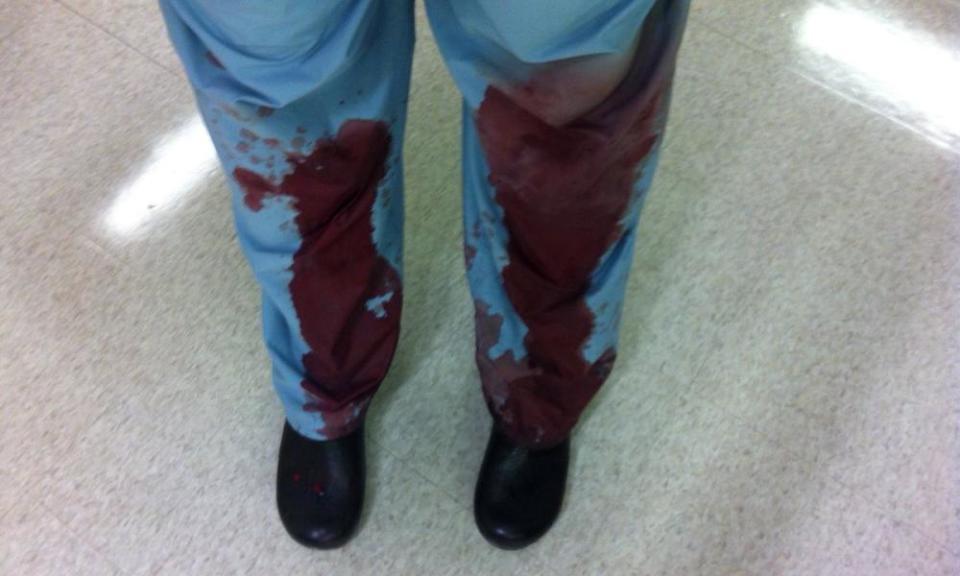#ThisIsOurLane: NRA's criticism spurs doctors to speak out on gun violence

Hours after a gunman shot and killed a doctor, a pharmacy assistant and a police officer at Chicago’s Mercy hospital, American physicians are calling for change, in what could be the most vocal anti-gun violence campaign from healthcare professionals in a generation, advocates said.
#ThisIsOurLane has become a reservoir of personal stories, gun violence statistics and calls to action fostered by the medical community. The hashtag started after a patronizing tweet by the National Rifle Association, America’s most influential gun rights group, and appears to have only grown in the week of violence that followed.
Someone should tell self-important anti-gun doctors to stay in their lane. Half of the articles in Annals of Internal Medicine are pushing for gun control. Most upsetting, however, the medical community seems to have consulted NO ONE but themselves. https://t.co/oCR3uiLtS7
— NRA (@NRA) November 7, 2018
“This hits close to home because I spent time at Mercy hospital during my residency,” wrote Dr Sara Hurtado Bares, an infectious disease specialist in Nebraska. “Time for the medical community to make our voices heard loud and clear. Enough is enough.”
“Today in America,” wrote Dr Mark Seamon, a professor of surgery at the University of Pennsylvania. “Three mass shootings – one stemming from domestic violence, one barely making our local news.”
Seamon has also tweeted alerts using an acronym unlikely to be recognized outside of American emergency rooms: GSW. Gunshot wound.
Our last 24hrs here at @UPennTrauma & have no doubt this is also happened at many trauma centers across the city & country. When I arrived at work this AM, no news trucks covering, no one asking for comments, no outrage. Astounding how we, as a society, can just look away pic.twitter.com/6h3haaK7Vi
— Mark Seamon (@MarkSeamonMD) May 4, 2018
The “individual, grassroots” movement, according to activists with the Brady Campaign to Prevent Gun Violence and other advocates,turned convention on its head. Healthcare professionals have been apprehensive about commenting on the hot button issue, fearing professional repercussions.
“Physicians have been hesitant to speak out in the past because of concerns they would be suffer consequences at work,” said Dr Judy Melinek, a forensic pathologist.
“The willingness to take on politically charged topics is definitely increasing,” said Seamon. “Previously many physicians were hesitant to speak out about the horrors of what they saw on a daily basis. No more.”
“I have told countless mothers, fathers, sisters, brothers, wives, husbands, sons and daughters that their loved one is dead,” he added. “It never, ever gets easier. But honestly, I don’t want it to get easier – I want to not have to do it any more.”
The groundswell of #ThisIsOurLane followed a confluence of criticism and violence. Within the space of a few hours, the NRA criticized an American College of Physicians policy paper that appears in the Annals of Internal Medicine; a shooting in California killed 12 people in a bar; and Melinek tweeted en route to her second gunshot autopsy of the week: “Do you have any idea how many bullets I pull out of corpses weekly?”
Melinek said physicians feared being seen as “representing their agencies”, offending hospital donors or turning off gun-owning patients. “I’ve had colleagues say to me, ‘You’re very brave’, with concerns there would be consequences for me.”
I held this 22-year-old’s heart & used my hand to pump blood through a bullet-riddled body. We resuscitated this person for nearly an hour & they made it to the OR, but would never make it home to their family. Tell me whose lane this is @NRA ? #thisisOURlane @ResearchAffirm pic.twitter.com/aXinICgI2g
— Regina Royan, MD MPH (@ReginaRoyan) November 14, 2018
In the week that followed, photos of emergency department staff holding #ThisIsOurLane signs have flooded Twitter. Doctors such as Megan Ranney, an emergency room physician at Rhode Island hospital held a “tweetatorial” to answer basic questions about gun violence.
Among statistics she tweeted: 100 Americans are killed and 200 injured by firearms each day. Most of those people are white men in rural America who use firearms to kill themselves. About one-third of gun violence is concentrated among minority men in inner cities. Firearms deaths are the second-leading cause of death for American youths.
The issue of deaths on such a scale, she argues, can be treated like motor vehicle crashes, which have seen an enormous decline in mortality. Already, nearly 40,000 healthcare workers have signed a letter calling for healthcare workers to “come together” to address the epidemic.
And we know that the #publichealth approach can and will work. We have decreased car crash deaths DESPITE there being more cars on the road, and more miles driven. We can do the same for #gunviolence. pic.twitter.com/O9Oh5p4omu
— Megan Ranney MD MPH (@meganranney) November 19, 2018
Longtime advocates for gun violence research, such as Dr Garen Wintemute, said the NRA’s tweet tapped into a reservoir of pent-up emotion on the issue.
“Pressure has built because with every mass shooting, there’s an increasing sense of needing to do something,” said Wintemute, whose website gives doctors resources for taking action. “What I’m really hoping is out of this will be a real surge in willingness to talk with patients about firearms, when it’s relevant, and take action when the course of the conversation concludes action needs to be taken.”

 Yahoo News
Yahoo News 